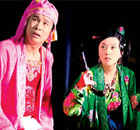Comment
'Tweet' should be character of the year
By Cui Xiaohuo (China Daily)
Updated: 2009-12-16 09:41
 |
Large Medium Small |

Once again, it is time to select a Chinese character that summarizes most of the happenings in the pop culture throughout the year.
The National Language Resources Monitoring and Research Center and the Commercial Press, which selected "inflation" and "harmonious" for two previous selections, have yet to release the candidates this year. However, bloggers have made their own choices.
On top of the list is "bei", the character for the passive voice in Chinese.
It's used to refer to the vulnerability of disadvantaged groups, shortly after job-hunting college graduates told the media in July they were "registered as employed" in an attempt to make school graduation records look better than they really were.
Other candidates include "cup", the homophonic pun for "tragedy" in Chinese, and "gate", the term inspired by the Watergate scandal to represent government or corporate scandals this year.

I have noticed that one blogger suggested the character "tui" as a candidate and I think it is great. The character, which stands for "push" or "spread" in its original meaning, is also the direct translation from perhaps the hottest Internet keyword of our time - "tweet".
Following the popularity of micro-blogging in China, the character has become a symbol of the rise of the online community in China.
With the development of social networking sites like Kaixin001 and Renren, Chinese bloggers have grown used to sharing pictures, messages and comments through online "tweets".
Social networking accelerated this year with the launch of 3G technology in March which enabled bloggers to "tweet" their messages 24 hours a day via smart phones. Time Magazine selected all Internet users as the Person of the Year in 2006. This year, Chinese who "tui" their messages should also get a place of recognition.









